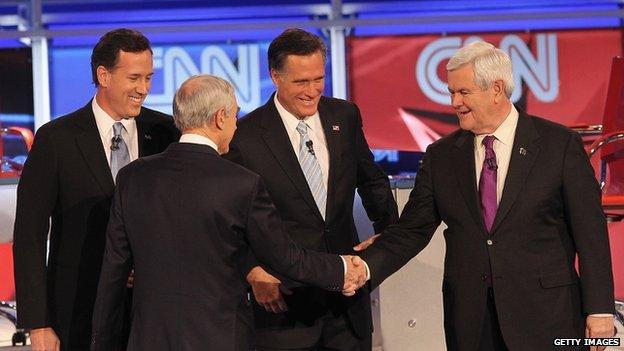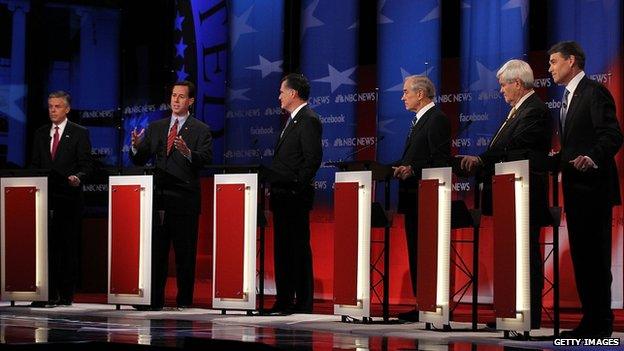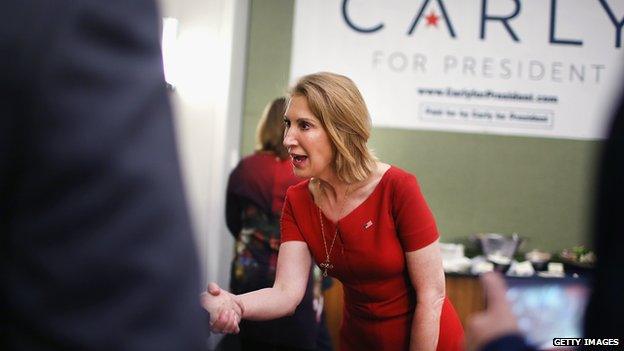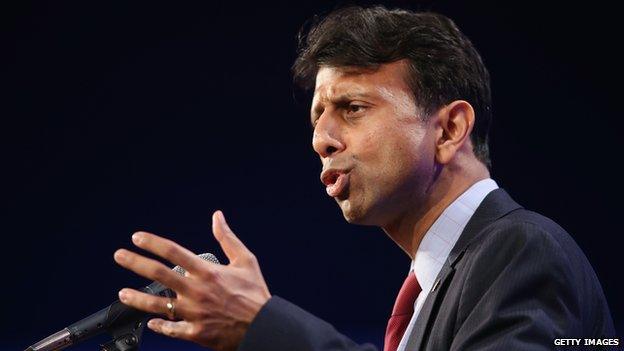Republican debates could become a game of musical chairs
- Published

The upcoming Republican debates are threatening to turn into a game of musical chairs, with candidates scrambling for a seat (er, lectern) on the stage when the music stops.
The problem for party leaders is a simple matter of arithmetic. There are already six formally announced candidates - Cruz, Paul, Rubio, Fiorina, Carson and Huckabee. By the early June, four more will have joined the race - Santorum, Pataki, Perry and Graham. The end of June could see four or five more - Jindal, Bush, Walker, Kasich and Christie.
That's 15 candidates - not including real estate mogul Donald Trump.
A debate with that many participants would either take all day or reduce the speakers to the shortest of soundbites. It's a situation British party and media officials grappled with, external earlier this year, when deciding who would be included in their general election debates. Those left out, such as Northern Ireland's Democratic Unionist Party, vociferously complained, external.

Even during the Republican primary debates four years ago, with at most "only" nine entrants at a time, the proceedings risked becoming an out-of-control circus act, with candidates at one point asked to respond to questions with a show of hands.
Recently word leaked out that the Republican Party was recommending that media debate sponsors limit participation to a maximum of 12 candidates. That set off, external a round of nail-biting, hair-pulling and rampant speculation about who would, or wouldn't, make the cut when the first event rolls around in Cleveland on 6 August.
"How do you pull off a nationally televised debate with more than a dozen announced candidates when the usual barriers to entry that winnow the field of contenders could do more harm than good?" asks, external the Washington Examiner's David M Drucker.
The challenge is that the field is chock full of high-profile politicians who hold - or recently held - major offices. Could a sitting governor or senator be left on the sidelines? If not, that already puts the total at nine - and doesn't include the only woman, Carly Fiorina, and one of the two minorities, Ben Carson.

Six candidates made for a crowded Republican debate stage in 2012
What about poll numbers? In the past, debates have been limited to only those who poll at 1% or above nationally. According to the latest Fox News survey, external, however, 14 candidates hit that mark - including six who aren't current officeholders.
Move the bar up a couple of points and you reduce the number to nine - but you exclude Ohio Governor John Kasich, Louisiana Governor Bobby Jindal, recent Texas Governor Rick Perry and 2012 runner-up Rick Santorum, among others… and keep Mr Trump on the podium.
Other ideas floated by party insiders include the ranking of candidates by the number of staffers they have hired in early voting states or the amount of small-donor money they've raised for their campaigns.
All this has prompted some wags and political operatives to come up with innovative ways to cull the herd.
According to multiple media reports, external, Mr Jindal's supporters are suggesting breaking the field into two randomly selected groups and holding back-to-back debates.
There are drawbacks to that idea, of course.

Could Carly Fiorina, the only female candidate, be excluded from the debates?
"Only the hardest of hardcore political junkies will sit through two nights of political chatter, so whoever ends up in Group B will end up whining that Group A had a larger audience," Allahpundit of the conservative HotAir blog writes, external.
He suggests having a tournament-style debate format. Give the five most prominent candidates - Bush, Walker, Rubio, Paul and Cruz - a "bye", with the remaining presidential hopefuls battling it out in early-round debates. The winners get to take on the heavyweights.
"If this process is going to be a circus, it at least ought to be fun," he writes.
Liberal commentator Bill Scher wholeheartedly endorses, external the idea of fundraising prowess as the sole means of judging candidates. What, he asks, could be a better embodiment of conservative values?

Bobby Jindal supporters have suggested back-to-back debates
"Democrats awkwardly lament the money chase while trying to master the race course, whereas Republicans have proudly equated campaign cash with the First Amendment," he writes. "All Republicans have to do is follow their own logic, and their debate conundrum will be resolved. Just let those with the most money have the most speech."
Conservative radio host Hugh Hewitt, on the other hand, thinks all this winnowing is a bad idea. He suggests, external a four-hour-long debating marathon with a few five-minute bathroom breaks scattered in.
"They will get huge ratings," he said. "No one's going to rush, no one's going to feel like they've got to get their time in, as opposed to the classic 90 minutes."
Then again, maybe axing the bathroom breaks would get even more viewers watching. Make each candidate drink a tall glass of water before the start, and those who can hold out till the end are invited to the next debate.
Call it Battle of the Bladders. It's the kind of reality television modern audiences crave.
Some of the Republican candidates in - and out - of the race
